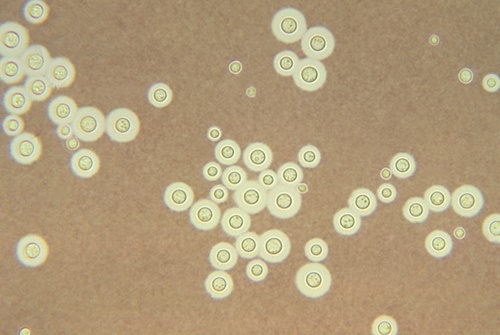26 August 2016. A collaboration between a company developing anti-fungal drugs and research group specializing in fungal infections aims to advance a new type of therapy for cryptococcal meningitis, a life-threatening infection affecting the brain and spinal cord. Financial details of the partnership between Viamet Pharmaceuticals in Research Triangle Park, North Carolina and Mycoses Study Group Education and Research Consortium in Birmingham, Alabama were not disclosed.
Cryptococcal meningitis is a fungal infection of the tissues covering the brain and spinal cord, caused by the fungus Cryptococcus neoformans found in soil worldwide. The disease usually affects people with weakened immune systems, such as those with AIDS, cirrhosis, diabetes, and leukemia. People who become infected normally breathe in the microscopic fungus. Symptoms include headache, fever, hallucinations, nausea, vomiting, sensitivity to light, and confusion or disorientation.
Viamet Pharmaceuticals discovers and develops therapies for fungal infections. The company says its technology combines computational techniques with chemical and biological processes to discovery therapy candidates that block the actions of metalloenzymes, proteins that function as enzymes but have metal ions in their chemistry. Viamet built a library of 200 metalloenzymes and inhibitors, including those with anti-fungal properties, from which it develops therapeutics.
The company’s lead product is an anti-fungal candidate code-named VT-1161 now being tested in clinical trials to treat vaginal yeast infections and onychomycosis, a type of toenail fungus. Viamet also has a candidate VT-1129 designed to treat cryptococcal meningitis. All three therapies target the metalloenzyme CYP51 for controlling fungus infections. The company says VT-1129 in preclinical tests shows it can eradicate the fungus causing cryptococcal meningitis from the central nervous system.
The Mycoses Study Group Education & Research Consortium, that started about a year ago, supports research and continuing education on invasive fungal infections. The consortium is an offshoot and successor to a previous organization, Mycoses Study Group, that investigated rare fungal infections. The new consortium is made up of research labs that generate an annual scientific agenda and conference.
The collaboration is expected to combine the clinical experience of the Mycoses Study Group Education & Research Consortium with the drug discovery and development work of Viamet. The initial focus of the partnership will be Viamet’s VT-1129 candidate, for which clinical tests are planned later this year.
Read more:
- Anti-Infection Compound Devised for Dental, Wound Care
- Alliance Building Platform Against Drug-Resistant Infections
- Dengue Vaccine Shown to Cut Infections, Hospitalizations
- Faster Process Developed to Test for Staph Infections
- Imaging Technique Captures RNA Viral Infections in Progress
* * *


 RSS - Posts
RSS - Posts
You must be logged in to post a comment.